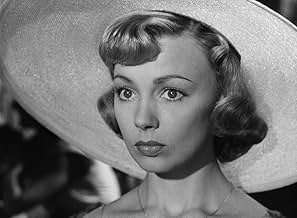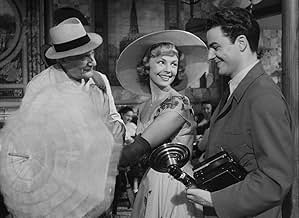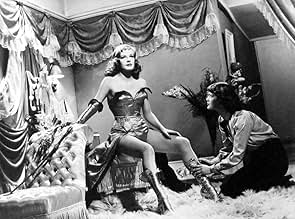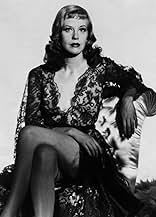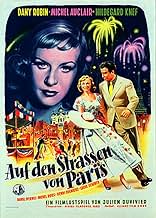Après le rejet de leur dernier scénario grotesque, deux scénaristes reviennent à l'essentiel pour préparer un nouveau film.Après le rejet de leur dernier scénario grotesque, deux scénaristes reviennent à l'essentiel pour préparer un nouveau film.Après le rejet de leur dernier scénario grotesque, deux scénaristes reviennent à l'essentiel pour préparer un nouveau film.
- Réalisation
- Scénario
- Casting principal
Hildegard Knef
- Rita Solar
- (as Hildegarde Neff)
Louis Seigner
- Un scénariste
- (as Louis Seigner de la Comédie Française)
- …
Jean-Louis Le Goff
- Un faux déménageur
- (as J.L. Le Goff)
Jean Clarieux
- Dédé
- (as J. Clarieux)
Avis à la une
It starts off very well: two scriptwriters, one short and irritable (Henri Cremieux) the other tall and phlegmatic (Louis Seigner) are batting around ideas for a new film. They come up with some characters: Robert, a press photographer; Henriette, daughter of a National Guard commander; Marcel/Maurice, a charming but not-very-honest man about town. These three, plus a half dozen more characters will spin a most entertaining story for the next 90 minutes or so.
I won't get into a discussion of Duvivier's place in cinematic history, nor whether we needed the New Wave or not, nor even the use of film-within-a-film. I will just say that this is a very inventive and charming little comedy that really should be on DVD. There is a tremendous virtuosic sequence about 60 minutes in--Marcel tries to rape Henriette in a car, she escapes and he chases her up the stairs in a building under construction--that must be seen to be appreciated.
I won't get into a discussion of Duvivier's place in cinematic history, nor whether we needed the New Wave or not, nor even the use of film-within-a-film. I will just say that this is a very inventive and charming little comedy that really should be on DVD. There is a tremendous virtuosic sequence about 60 minutes in--Marcel tries to rape Henriette in a car, she escapes and he chases her up the stairs in a building under construction--that must be seen to be appreciated.
10benoit-3
A penpal from the IMDb was good enough to send me a VHS copy of this French classic unavailable in America. It's a very unusual comedy: After the rejection of their latest - and preposterous - scenario, two scriptwriters get back to basics to prepare a new movie. The new scenario centers on Henriette, a pretty, lively Parisian, and how she spends the 14th of July in Paris with her fiancé. We follow the tribulations of Henriette as various other characters make their entry in the story and turn a traditional festive day into something more adventurous than expected.
What this synopsis doesn't say is that this movie has a very unconventional narrative structure. It unfolds, develops, rolls back on itself and starts again according to the whims, arguments and opinions of the two on-screen screenwriters, their wisecracking female typist and their two girlfriends, while they go about everyday activities like going to the barber or fixing dinner. One of the scriptwriters (Henri Crémieux) fancies himself an anarchist and revolutionary (long before the New Wave) while the other (Louis Seigner) is more of a practical-minded classicist. The first one is always insisting on improbable and melodramatic turns of event, murders or suicides, while the other wants to keep things light, realistic and entertaining. All through the film, scenes and characters are introduced, analyzed and disposed of, resurrected or simply erased from the record. The result is one of those unknown masterpieces of French cinema that will probably stay unknown in America until the Criterion Collection takes a fancy to it.
This film boasts magnificent set pieces, female nudity, sexual situations, witty dialogue, unbelievably risky photography and stunts. Its editing also makes "Citizen Kane" look a student film. But it is most of all revolutionary in its narrative structure. It has been remade twice, as "Paris when it sizzles" (1964) and "À l'attaque" (2000). Even if the first of these remakes was a relative failure, it was also the first mainstream American comedy to call into question the narrative clichés and conventions of Hollywood film-making. The film is taking liberties with the space-time continuum in ways that would inspire numerous films as diverse as "Zazie dans le metro", "Adaptation", "Run, Lola. Run", "Amélie", the later comedies of Sacha Guitry and even the relatively few lighthearted moments of Truffaut's "Shoot the Piano Player".
To this day, anyone who knows about this film which gives cinematic story-telling the unlimited potential of a radio play - is sill in awe of its wonders.
I have a question for anyone who has seen this film or only heard about it: "Even though it would seem the most natural thing to do, in movies, for a director to play with the space and time structure of his story, can you think of any example previous to 1952 where an on-screen scriptwriter intervenes to change the run of the story?"
The only examples that come to my mind are both by Preston Sturges. There is a short sequence in "Sullivan's Travels" where Joel McCrea, as a director, toys around with the story of a film he wants to make called "Brother, Where Art Thou"; and another one in "Unfaithfully Yours" where the conductor-hero plans a murder in his mind that doesn't quite turn out as expected in reality. But even these examples don't involve the re-writing of the film's storyline as it goes along My question also eliminates any time-travel-type science-fiction film as well as films that straddle the borderline between dreams and reality like René Clair's "Belles de nuit" (1952).
What this synopsis doesn't say is that this movie has a very unconventional narrative structure. It unfolds, develops, rolls back on itself and starts again according to the whims, arguments and opinions of the two on-screen screenwriters, their wisecracking female typist and their two girlfriends, while they go about everyday activities like going to the barber or fixing dinner. One of the scriptwriters (Henri Crémieux) fancies himself an anarchist and revolutionary (long before the New Wave) while the other (Louis Seigner) is more of a practical-minded classicist. The first one is always insisting on improbable and melodramatic turns of event, murders or suicides, while the other wants to keep things light, realistic and entertaining. All through the film, scenes and characters are introduced, analyzed and disposed of, resurrected or simply erased from the record. The result is one of those unknown masterpieces of French cinema that will probably stay unknown in America until the Criterion Collection takes a fancy to it.
This film boasts magnificent set pieces, female nudity, sexual situations, witty dialogue, unbelievably risky photography and stunts. Its editing also makes "Citizen Kane" look a student film. But it is most of all revolutionary in its narrative structure. It has been remade twice, as "Paris when it sizzles" (1964) and "À l'attaque" (2000). Even if the first of these remakes was a relative failure, it was also the first mainstream American comedy to call into question the narrative clichés and conventions of Hollywood film-making. The film is taking liberties with the space-time continuum in ways that would inspire numerous films as diverse as "Zazie dans le metro", "Adaptation", "Run, Lola. Run", "Amélie", the later comedies of Sacha Guitry and even the relatively few lighthearted moments of Truffaut's "Shoot the Piano Player".
To this day, anyone who knows about this film which gives cinematic story-telling the unlimited potential of a radio play - is sill in awe of its wonders.
I have a question for anyone who has seen this film or only heard about it: "Even though it would seem the most natural thing to do, in movies, for a director to play with the space and time structure of his story, can you think of any example previous to 1952 where an on-screen scriptwriter intervenes to change the run of the story?"
The only examples that come to my mind are both by Preston Sturges. There is a short sequence in "Sullivan's Travels" where Joel McCrea, as a director, toys around with the story of a film he wants to make called "Brother, Where Art Thou"; and another one in "Unfaithfully Yours" where the conductor-hero plans a murder in his mind that doesn't quite turn out as expected in reality. But even these examples don't involve the re-writing of the film's storyline as it goes along My question also eliminates any time-travel-type science-fiction film as well as films that straddle the borderline between dreams and reality like René Clair's "Belles de nuit" (1952).
What can I say of "La Fête à Henriette"?It's stating the obvious to say that Julien Duvivier was one of the most inventive directors of the French cinema.He almost never looked back,pushing his experiments forward for most of the films he made.
"La Fete à Henriette" did not come out of the blue:it's the son of "Sous le Ciel de Paris" one of his most extraordinary achievements.I will try and explain the connection:the 1951 work was made of little stories ,subplots -"Magnolia" was not that much an innovation for that matter- and Duvivier already displayed a compassion for his characters ,he was some kind of puppet master ,a God in miniature who was fascinated by the whims of fate.
"La fete à Henriette" is at first a more demanding -less entertaining maybe -,more free-form ,but when you've watched it ,all you have got to do is stand and applaud.There are many more ideas and innovations than in ,say,Truffaut's "day for night" ("la Nuit Américaine").
Two scenarists see their last screenplay banned by the censorship .That 's why the movie begins with ???? and ???? and ????? in lieu of cast and credits.They've got a whole screenplay to write,and according to the mood they are in,"La Fete à Henriette" will be in turn romantic,dramatic,zany , satirical,you name it.Henri Jeanson lets his inspiration flow and his lines,his ferocious lines never lose their bite ( A VIP from the French government is about to die and the journalists around the mansion are exchanging nice lines such as: "the ideas he has! dying on the 14th of July! or "Hope he 'll kick the bucket before aperitif time!")
It is Henriette 's fete ,the 14th of July ,French Bastille Day!A gorgeous girl ,played by the young romantic female lead of the era ,Dany Robin (most of the users saw her in Hitchcock's "Topaz"),has a fiancé , a photograph who has a -professional,that's what he says that is- rendezvous with a glamorous horsewoman (Hildegarde Kneff).Henriette is cross and she starts to flirt with the first to come .That character whose name is subject to several changes is played by highly talented Michel Auclair.The narration is not linear ,since Auclair's character is now a crazy person fresh from the asylum (and Jeanson gives one of his best anti-militarist lines ever- Auclair to a general:"you see me and you do not stand to attention!),now a b..... who tries to rape the heroine,now a hoodlum with a big heart,now a wealthy family's son....The whims of fate! Duvivier himself reveals as he never did in this work:although it's meant to be a "happy" tale,his legendary pessimism resurfaces now and then.
Duvivier's style is constantly superb and the camera work is dazzling.When the story (ies) become(s) too far-fetched ,the scenes are filmed obliquely.The plot often stops since the two writers do not agree and they have endless discussions about what will happen next.They even quote their colleagues: one of them mentions the script (a news item in the paper he's reading ) of "ladri di biciclette " ("That would not make a good film!") ;later they will parody Marcel Carné as they introduce for a short while a blind man who epitomizes ...fate of course (remember "les Portes de la Nuit").Even the last scene of the fireworks verges on a spoof on romantic drama.You can go as far as to write that Duvivier appropriates René Clair' s "Quatorze Juillet" ,but he effortlessly beats his predecessor at his own game.
Expect the unexpected and till the last pictures! The unexpected final twist is witty and as the cast and credits finally appear after the final "revelation" ,we feel how much "Henriette" was ahead of its time,not only because it was remade by Richard Quine in the sixties ( the so-so " Paris when it sizzles) but because many of its strokes of inspiration we found them back in such later works as Michel Drach's "Les Violonsdu Bal" (the subject has nothing to do with "Henriette" but it imitates the ending)or Peter Weir's "Truman Show".
Did we need the Nouvelle Vague so bad when we had a great director like Duvivier?A writer like Jeanson? WE DIDN'T!!!!
"La Fete à Henriette" did not come out of the blue:it's the son of "Sous le Ciel de Paris" one of his most extraordinary achievements.I will try and explain the connection:the 1951 work was made of little stories ,subplots -"Magnolia" was not that much an innovation for that matter- and Duvivier already displayed a compassion for his characters ,he was some kind of puppet master ,a God in miniature who was fascinated by the whims of fate.
"La fete à Henriette" is at first a more demanding -less entertaining maybe -,more free-form ,but when you've watched it ,all you have got to do is stand and applaud.There are many more ideas and innovations than in ,say,Truffaut's "day for night" ("la Nuit Américaine").
Two scenarists see their last screenplay banned by the censorship .That 's why the movie begins with ???? and ???? and ????? in lieu of cast and credits.They've got a whole screenplay to write,and according to the mood they are in,"La Fete à Henriette" will be in turn romantic,dramatic,zany , satirical,you name it.Henri Jeanson lets his inspiration flow and his lines,his ferocious lines never lose their bite ( A VIP from the French government is about to die and the journalists around the mansion are exchanging nice lines such as: "the ideas he has! dying on the 14th of July! or "Hope he 'll kick the bucket before aperitif time!")
It is Henriette 's fete ,the 14th of July ,French Bastille Day!A gorgeous girl ,played by the young romantic female lead of the era ,Dany Robin (most of the users saw her in Hitchcock's "Topaz"),has a fiancé , a photograph who has a -professional,that's what he says that is- rendezvous with a glamorous horsewoman (Hildegarde Kneff).Henriette is cross and she starts to flirt with the first to come .That character whose name is subject to several changes is played by highly talented Michel Auclair.The narration is not linear ,since Auclair's character is now a crazy person fresh from the asylum (and Jeanson gives one of his best anti-militarist lines ever- Auclair to a general:"you see me and you do not stand to attention!),now a b..... who tries to rape the heroine,now a hoodlum with a big heart,now a wealthy family's son....The whims of fate! Duvivier himself reveals as he never did in this work:although it's meant to be a "happy" tale,his legendary pessimism resurfaces now and then.
Duvivier's style is constantly superb and the camera work is dazzling.When the story (ies) become(s) too far-fetched ,the scenes are filmed obliquely.The plot often stops since the two writers do not agree and they have endless discussions about what will happen next.They even quote their colleagues: one of them mentions the script (a news item in the paper he's reading ) of "ladri di biciclette " ("That would not make a good film!") ;later they will parody Marcel Carné as they introduce for a short while a blind man who epitomizes ...fate of course (remember "les Portes de la Nuit").Even the last scene of the fireworks verges on a spoof on romantic drama.You can go as far as to write that Duvivier appropriates René Clair' s "Quatorze Juillet" ,but he effortlessly beats his predecessor at his own game.
Expect the unexpected and till the last pictures! The unexpected final twist is witty and as the cast and credits finally appear after the final "revelation" ,we feel how much "Henriette" was ahead of its time,not only because it was remade by Richard Quine in the sixties ( the so-so " Paris when it sizzles) but because many of its strokes of inspiration we found them back in such later works as Michel Drach's "Les Violonsdu Bal" (the subject has nothing to do with "Henriette" but it imitates the ending)or Peter Weir's "Truman Show".
Did we need the Nouvelle Vague so bad when we had a great director like Duvivier?A writer like Jeanson? WE DIDN'T!!!!
Two scriptwriters come up with a story and end up with a day in the life of Henriette as played by Dany Robin. It plays out in real time as they are making up the story and takes several directions at the end of which we have watched the story of 'Henriette's Holiday' which all essentially takes place on her birthday. The end.
Aubin is ok in the lead role, somewhat forgettable. It is Michel Auclair (Maurice/Marcel) who stands out as the 'other man' on Aubin's special day. Her photographer boyfriend Michel Roux (Robert) spends his time distracted from her and has a sneaky meeting planned behind Aubin's back with circus performer Hildegard Knef (Rita). The film develops itself until we get fireworks at the end of our love story.
I have to further mention Knef, who I recently saw in "Decision Before Dawn" (1951). She plays an experienced lady in both films, if you know what I mean, and she does it well. However, there is also a nod to other film classics in this film. Knef very obviously resembles Rita Hayworth in "Gilda" 1946 and there are several shots that seem lifted from that film just to stress the similarity. She is even given the name "Rita"! No-one has yet mentioned this so I'm putting it out there.
It is an entertaining film whilst you watch it and there are funny moments. This is a creative film that is both well done and original.
Aubin is ok in the lead role, somewhat forgettable. It is Michel Auclair (Maurice/Marcel) who stands out as the 'other man' on Aubin's special day. Her photographer boyfriend Michel Roux (Robert) spends his time distracted from her and has a sneaky meeting planned behind Aubin's back with circus performer Hildegard Knef (Rita). The film develops itself until we get fireworks at the end of our love story.
I have to further mention Knef, who I recently saw in "Decision Before Dawn" (1951). She plays an experienced lady in both films, if you know what I mean, and she does it well. However, there is also a nod to other film classics in this film. Knef very obviously resembles Rita Hayworth in "Gilda" 1946 and there are several shots that seem lifted from that film just to stress the similarity. She is even given the name "Rita"! No-one has yet mentioned this so I'm putting it out there.
It is an entertaining film whilst you watch it and there are funny moments. This is a creative film that is both well done and original.
Post-war French cinema faced something of a crisis with the massive influx of movies from Hollywoodland and this utterly delightful piece from Julien Duvivier, one of his country's greatest cinéastes, reflects his own dilemma as to whether to remain faithful to his pre-war style or to give audiences films with maximum action and minimum psychology. He and his frequent collaborator Henri Jeanson often disagreed, as do the scénarists here, played by Louis Seigner and Henri Crémieux, and we are shown the sometimes tortuous creative process and the multiple developments a story can take.
The performances are delicious with Dany Robin at her most enchanting whilst Georges Auric's scintillating score, Roger Hubert's camerawork and the cutting of Duvivier's editor of choice Marthe Poncin, notably in the splendid chase sequence, contribute to the creation of an overlooked Gallic gem.
On the principle that bigger is not necessarily better, it is probably kinder to pass over in silence Richard Quine's expensively mounted but leaden remake.
The performances are delicious with Dany Robin at her most enchanting whilst Georges Auric's scintillating score, Roger Hubert's camerawork and the cutting of Duvivier's editor of choice Marthe Poncin, notably in the splendid chase sequence, contribute to the creation of an overlooked Gallic gem.
On the principle that bigger is not necessarily better, it is probably kinder to pass over in silence Richard Quine's expensively mounted but leaden remake.
Le saviez-vous
- AnecdotesFrench censorship visa # 13195.
- Citations
Un scénariste: What if we simply told a love story?
Un scénariste: Between two women?
Un scénariste: Between two women?
Un scénariste: What? Between two men?
Un scénariste: Idiot!
Un scénariste: Between who and who then?
- ConnexionsReferenced in Kedamono no iru machi (1958)
Meilleurs choix
Connectez-vous pour évaluer et suivre la liste de favoris afin de recevoir des recommandations personnalisées
Détails
- Durée
- 1h 58min(118 min)
- Couleur
- Mixage
- Rapport de forme
- 1.37 : 1
Contribuer à cette page
Suggérer une modification ou ajouter du contenu manquant

